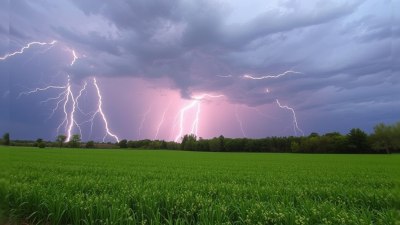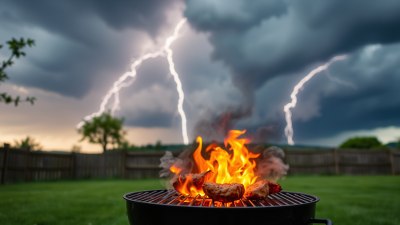Why River Water Always Feels Like It’s Judging You for Being a Human
Explore the curious feeling of being judged by river water. Discover the psychology and cultural insights behind this phenomenon.

This image was created with the assistance of Freepik
Have you ever found yourself standing by a river, gazing into the flowing water, and feeling an odd sensation that it somehow judges you? It's a strange thought, but many people experience this feeling, often attributing it to the deep, ancient flow of nature combined with their own human complexities. This phenomenon dives into the intersection of psychology, spirituality, and the awe of nature, presenting a fascinating exploration of why rivers can evoke such potent emotions.
The Nature of Judgment
To understand why river water might feel like it’s “judging” us, it’s essential first to consider what we mean by judgment. Judgment can be a reflection of our self-esteem, past experiences, or cultural influences. When individuals visit natural settings like rivers, they often confront their inner selves, leading to introspection. The contrast between the euphoria of nature’s grandeur and the trivial concerns of human life can create a sense of inadequacy.
The Human Experience Against Nature
Rivers have been vital to human civilization for thousands of years. These bodies of water are not just physical paths; they are historical witnesses. When we stand by a river, we cannot help but contrast our fleeting existence with its eternal flow. This juxtaposition may lead to the perception of being judged, as we see ourselves as temporary beings in the presence of something unchanging and ancient.
The Spirits of Nature
In many cultures, rivers are seen as sacred or inhabited by spirits. This anthropomorphism can contribute to feelings of being judged. If we believe there are spirits inhabiting the waters, we might feel a sense of scrutiny, as if these entities are assessing our worthiness or connection to nature. The belief in the spiritual dimension of rivers has been present in multiple cultures, from Native American traditions to ancient river worship in Egypt.
Psychological Aspect of Judgement
On a psychological level, feelings of inadequacy are often projected onto external entities when people confront their insecurities. The reflective surface of the water may evoke self-reflection, compelling individuals to face their shortcomings. The sound of flowing water can stimulate a contemplative state, urging us to confront our values and life choices, which can feel akin to judgment.
Rivers as Timekeepers
Rivers have historically been understood as symbols of time—they flow continuously, rarely stopping or turning back. This relentless movement may evoke feelings of urgency in humans, who are conscious of their temporality. Feeling judged may stem from the realization that while rivers carry on, we are often bogged down by problems that seem trivial in their eternal presence. This awareness can lead to anxiety, making individuals feel judged by nature for their inability to appreciate life to the fullest.
Emotional Reflection
The stillness of the water can lead to deep emotional reflection. The depths of a river can metaphorically represent the depths of our own emotions. When you look into the water, it may feel like it is reaching into your soul, assessing your happiness or discontent. While it can be a source of tranquility, it can also dramatize your mental struggles and bring forth feelings of inadequacy. This duality could explain the phenomenon of feeling judged by river water.
The Power of Nature's Beauty
The beauty of rivers often evokes awe, but awe can be a complex emotion. It can inspire admiration for nature, yet simultaneously provoke self-doubt. People can feel small and unimportant when standing in front of something grand. This juxtaposition often leads to feelings of being scrutinized or judged. The feelings stemming from such beauty can act as a mirror, reflecting back both our admiration for nature and our questioning of our value among it.
Collective Memory and Myth
Many myths and stories are connected to rivers, from ancient gods to modern tales of heroism. These narratives shape our interactions with rivers and influence our emotions. The heavy cultural weight of rivers can enhance the feeling that they hold power over us. When experiencing a river, you may subconsciously refer to stories passed down through generations, linking your existence with their historical significance, which can culminate in the sensation of being judged.
Environmental Consciousness
In today’s world, rivers are also symbols of environmental concerns, often representing the health of our ecosystems. Standing alongside them can serve as a reminder of human impact on the planet. The weight of ecological guilt can contribute to feelings of judgment when people realize that their existence may adversely affect nature. This awareness can evoke a profound and uncomfortable reckoning, where the water seems to reflect our shortcomings as caretakers of the Earth.
The Contrast of Life
Rivers carry the paradox of life and death; they nurture life while also being associated with death in various cultures. This duality elicits feelings of ambivalence in individuals. While contemplating the beauty of a river, one may also confront notions of mortality and the fleeting nature of life, further feeding the sensation of being judged by the application of existential stakes. This often creates a profound experience that transcends the mundane realities of everyday life.
Ultimately, the feeling that river water is judging you is a multilayered experience rooted in cultural, psychological, and emotional contexts. The juxtaposition of the eternal flow of the river against our human fragility ignites a complex array of feelings, from awe to guilt to reflection. Whether it stems from spiritual beliefs, anthropomorphism, or personal introspection, this sensation is an intimate interaction with nature—one that compels us to ponder our place within this vast, beautiful, and indifferent world.











